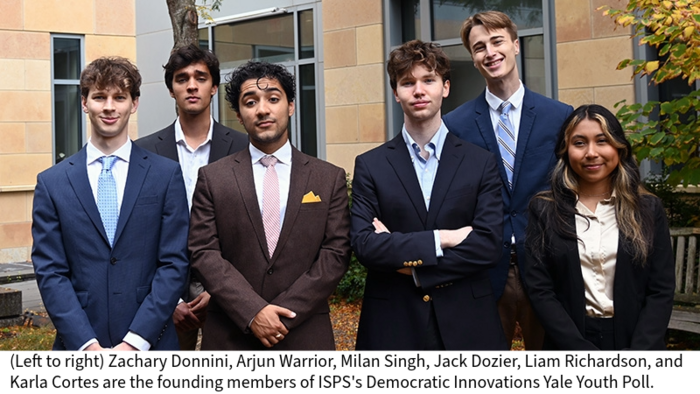Yale Youth Poll: Students Lead Nation’s Largest Youth Political Survey

Among the polls that popular statistician and poker player Nate Silver included in one of his final models to predict the presidential race: a poll conducted by the New York Times and Siena College, one by international online research data and technology organization YouGov, and one conducted by a group of Yale undergraduate students.
Milan Singh, a junior majoring in economics, and Jack Dozier, a sophomore majoring in political science, founded Yale Youth Poll in August at the Institution for Social and Policy Studies (ISPS). Their team fielded the largest poll in the country to survey the political opinions and knowledge of voters aged 18-29.
“I saw a need,” Dozier said. “A lot of professors at Yale do polling for their research, but not necessarily polling for the sake of polling like they do at Quinnipiac, Patriot Polling at Columbia, or the Harvard Institute of Politics. And I thought there was an opportunity to cover something they don’t.”
Dozier proposed an ongoing youth polling project to Limor Peer, ISPS’s associate director for research and strategic initiatives. She connected him to Singh through ISPS faculty fellow Josh Kalla, whom Singh had approached with a similar proposal after taking one of his classes.
“What they did was very sophisticated,” said Kalla, associate professor of political science who supervises an undergraduate research group at ISPS. “If you think about what a professional pollster needs — an idea, money to pay for a polling service, and the ability to implement that idea, analyze the data, and get it out into the world — these students did all of that.”
ISPS funded Yale Youth Poll through Democratic Innovations, a program that identifies and tests new ideas for improving the quality of democratic representation and governance. The team includes lead data scientist Zachary Donnini, ’25, media director Karla Cortes, ’27, and data scientists Arjun Warrior, ’26, and Liam Richardson, ’25.
“We are always open to supporting entrepreneurial students at ISPS when their ideas link up with our research programs, and we could not be more impressed with the group at Yale Youth Poll,” said ISPS Director Alan Gerber, Sterling Professor of Political Science. “They saw that other institutions might survey young people, but these other polls do not necessarily make comparisons to the general population or ask about their knowledge of American democracy or their views on significant issues.”
The students drafted the questions about the election but also policy reforms and civic knowledge with feedback from Kalla and Gerber, completed the Institution Review Board’s process for conducting human research, navigated the procurement process with the help of ISPS staff, fielded the survey to a sample of 5,500 registered voters, analyzed the data, and released the findings on Oct. 15.
“One of the distinctive features of this survey is that the students included questions on threats to democracy and their views on possible reforms,” Gerber said.
The poll found Kamala Harris leading Donald Trump 56-35 among young voters, compared with a 1-percentage-point lead she had among all voters, in line with other polls showing a close race in the national popular vote. The students also shared data about how younger voters were more likely to support progressive positions and have lower civic knowledge than the overall electorate.
“I was very happy with the poll we were able to put together,” said Singh, who has worked on campaigns and for a professional polling outfit. “I did not imagine we would get this level of coverage or be included with these poll aggregators because we are so new.”
Singh, a registered Democrat, took pride in crafting a nonpartisan poll.
“I’m aware of my biases, and when I sat down to write this poll, I didn’t do it as a Democrat but as an American who wants to receive clean, objective data,” he said.
Dozier said one goal was to incorporate different perspectives into the survey.
“The poll represents the university but also getting non-biased information that gives us a realistic snapshot in time, focused on this understudied moment for young adults,” he said.
Dozier expressed hope that the knowledge gap revealed in the poll results will close over time as younger people become more engaged with politics.
“I’m hopeful that there will be opportunities for people our age to better understand things like the filibuster or who holds the houses of Congress,” he said. “Such knowledge is crucial to understanding how the government is working.”
Now that the election is over, the group plans to explore new topics and recruit underclassmen to join the team, particularly students experienced in computer science, statistics, and data science.
“We are incredibly grateful to ISPS for its support and expertise,” Dozier said. “The money was important, but money will only go so far if you don’t have the knowledge to refine the survey. We are so thankful for the faith professors Kalla and Gerber placed in us.”
Yale students interested in participating in Yale Youth Poll can send an email to youthpoll@elilists.yale.edu.